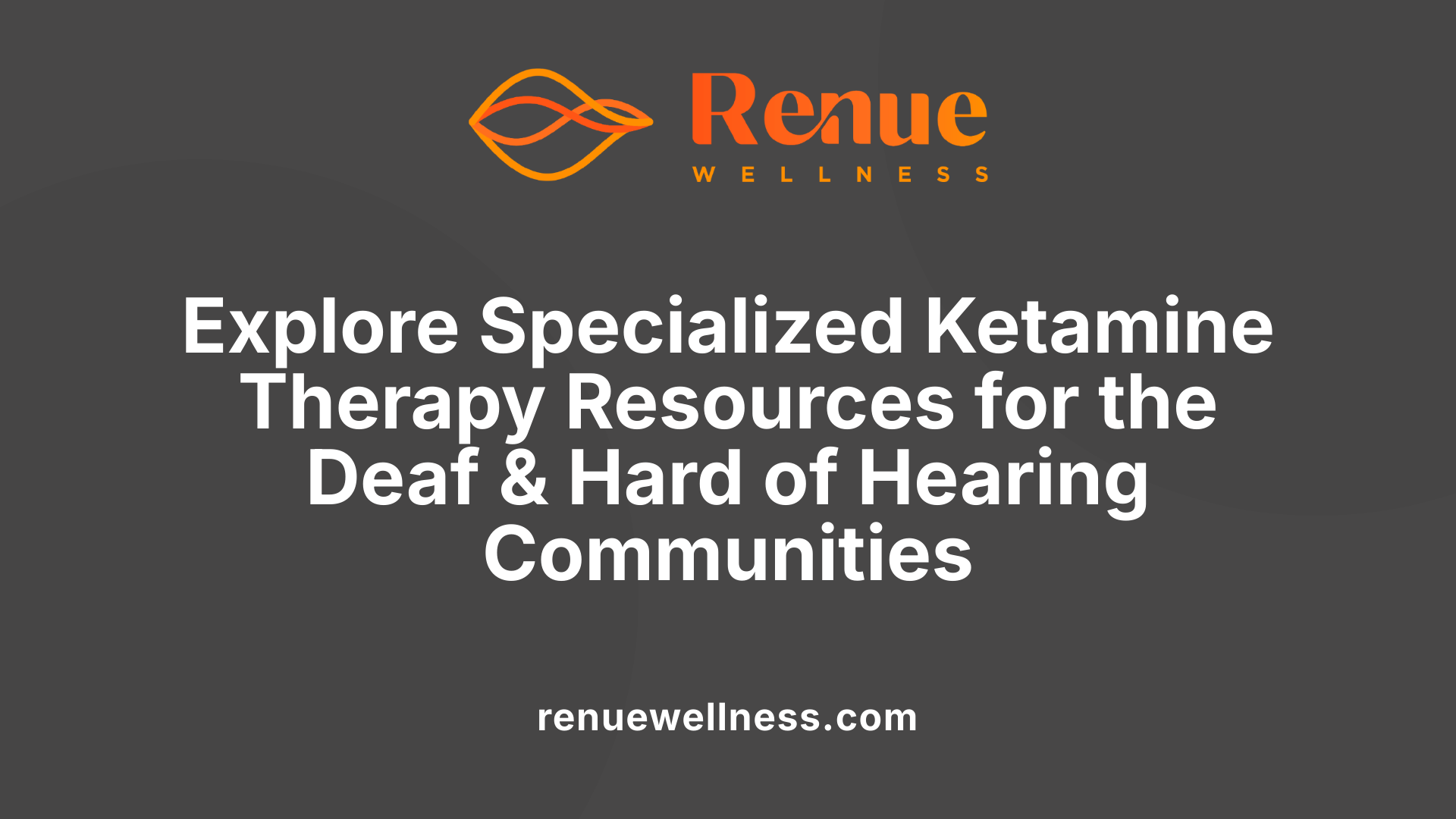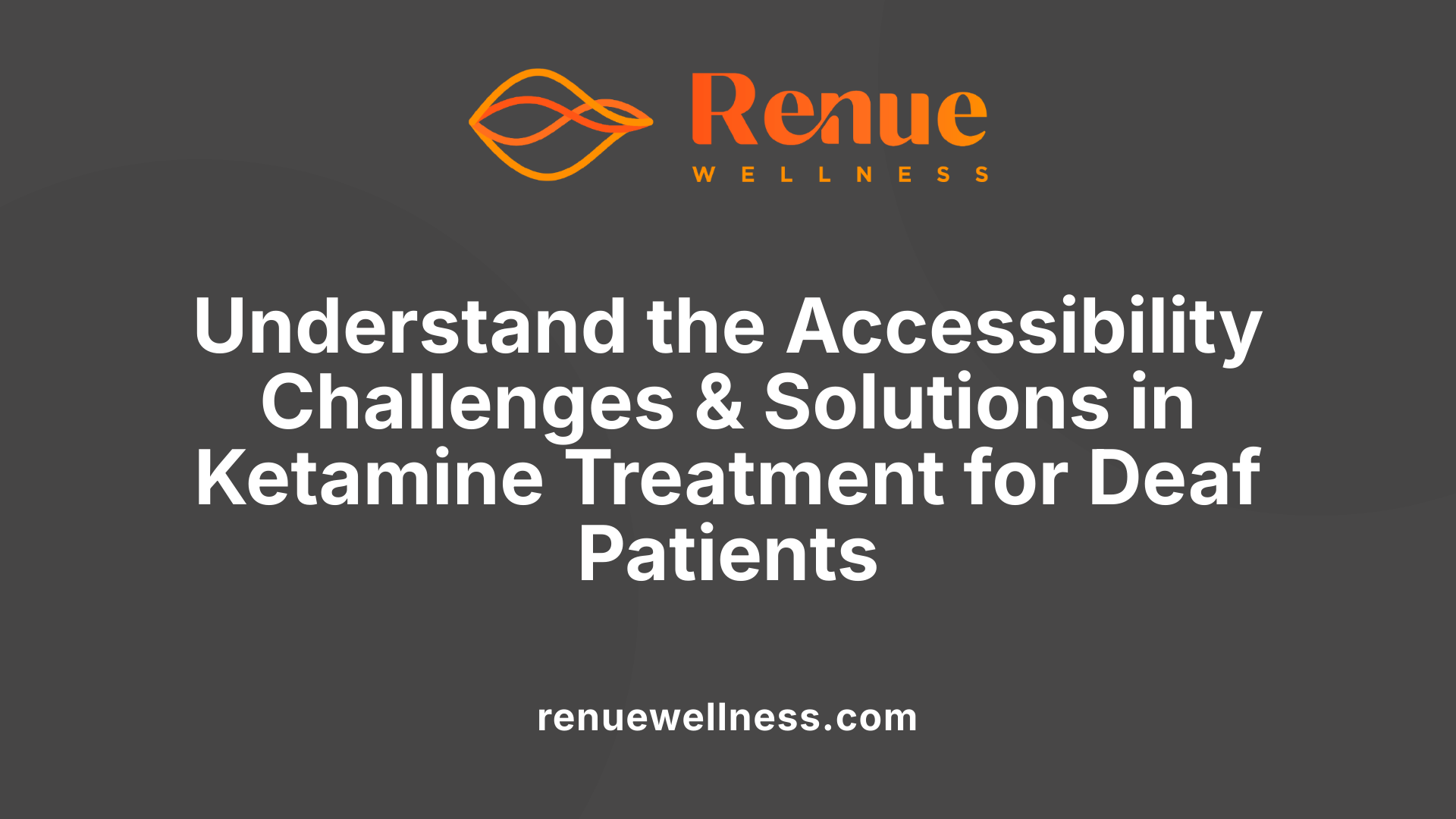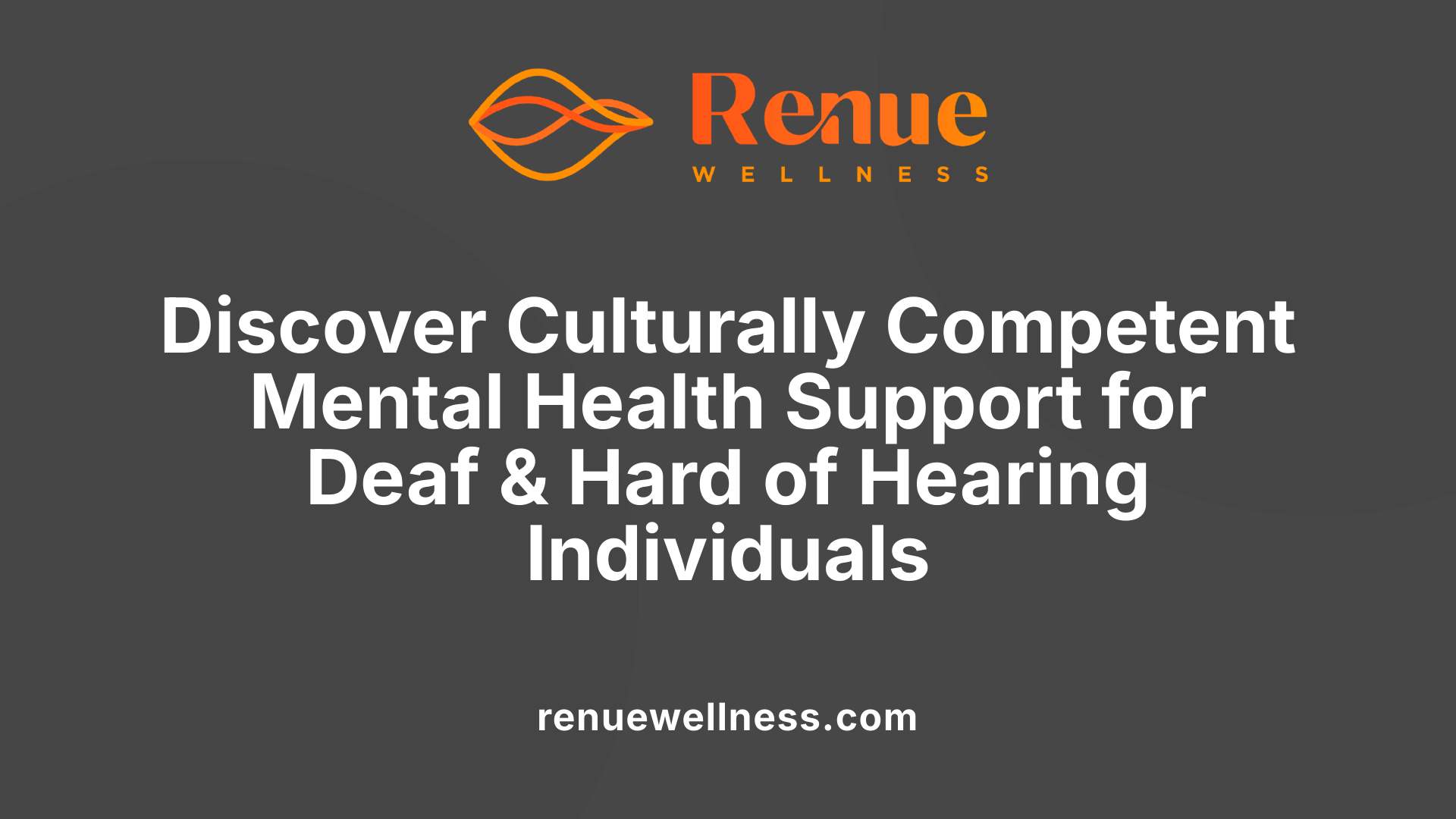Ketamine Therapy: Resources for the Deaf and Hard of Hearing


August 1, 2025
Understanding the Landscape of Ketamine Therapy for Deaf and Hard-of-Hearing Communities
Ketamine therapy has emerged as a promising treatment for substance use disorders and mental health challenges. However, for the deaf and hard-of-hearing community, accessing these services poses unique challenges and opportunities. This article explores available resources, accessibility considerations, specialized support services, advocacy efforts, existing gaps, and community networks dedicated to ensuring equitable mental health and ketamine treatment.
Available Ketamine Therapy Resources Tailored to Deaf and Hard of Hearing Individuals

What are the available ketamine therapy options and resources for the deaf and hard of hearing community?
Ketamine therapy has gained recognition as a treatment for certain substance use disorders and depression. The available options include specialized clinics that administer ketamine either intravenously or through nasal spray, often paired with behavioral therapy to support recovery.
For members of the deaf and hard of hearing community, accessing these services requires accommodations to effectively communicate and understand treatment plans. Clinics that serve this population typically provide services such as sign language interpreters, TTY devices, FM hearing assistive systems, and other auxiliary aids. These accommodations ensure compliance with the Americans with Disabilities Act (ADA), which mandates effective communication in healthcare settings.
Organizations like the Hearing Loss Association of America and Deaf Off Drugs and Alcohol play pivotal roles in offering resources, advocacy, and support tailored specifically for deaf and hard-of-hearing individuals seeking addiction treatment. They help connect individuals to healthcare providers experienced in serving patients with unique communication needs, ensuring treatment is both accessible and culturally competent.
Consulting healthcare providers knowledgeable about deaf culture and communication methods is vital. Such providers can help determine whether verbal communication, sign language, or assistive technologies are best suited for the patient.
Increasing awareness about accessible ketamine therapy options and integrating these communication tools can boost treatment success rates among deaf and hard-of-hearing individuals. Ultimately, efforts to improve accessibility and cultural sensitivity contribute to more effective and equitable substance use disorder treatments.
Resources and advocacy organizations
| Organization | Services Offered | Special Focus | Contact Methods |
|---|---|---|---|
| Hearing Loss Association of America | Community support, resources | Deaf and hard-of-hearing advocates | Website, phone, ASL video chat |
| Deaf Off Drugs and Alcohol | Education, treatment resources | Addiction support for deaf individuals | Website, email |
| National Deaf Therapy | Online therapy, ketamine resources | Therapy tailored for deaf community | Website, video conferencing |
| My Deaf Therapy | Telehealth services | Deaf-competent mental health care | Website, ASL chat |
Utilizing these resources can help individuals access the specialized care they need, ensuring effective treatment and greater health outcomes.
Search tip for further information
To find additional options, search using the phrase "Ketamine therapy resources for Deaf and Hard of Hearing community" for updated and local services.
Accessibility Considerations and Challenges in Ketamine Therapy for Deaf and Hard of Hearing Patients

What accessibility considerations and challenges exist for deaf and hard of hearing individuals seeking ketamine therapy?
Providing equitable access to ketamine therapy for Deaf and hard of hearing individuals requires careful attention to communication and systemic barriers. One crucial aspect is ensuring effective communication during treatment sessions. This involves employing qualified sign language interpreters who are fluent in American Sign Language (ASL) and training clinicians to communicate effectively with Deaf patients.
Clinics and healthcare providers should also consider employing ASL-fluent clinicians or mental health professionals familiar with Deaf culture. This helps foster trust and understanding, making the treatment process smoother and more respectful.
In addition to direct communication, providing accessible informational materials—such as consent forms, educational brochures, and aftercare instructions—in formats that are easy to understand and available in ASL or captioned formats is vital.
However, numerous challenges hinder access. A significant systemic issue is the shortage of healthcare providers trained specifically to serve Deaf communities, especially in behavioral health settings. Many providers lack awareness or understanding of Deaf culture and the importance of culturally competent care.
Legal and policy frameworks, like the federal Section 1557 of the Affordable Care Act, mandate effective communication accommodations. Despite this, enforcement is inconsistent, and many facilities do not fully comply, leaving Deaf individuals at a disadvantage.
Community stigma and misconceptions about mental health can discourage Deaf individuals from seeking treatment. Some may also face mistrust stemming from past negative healthcare experiences or concerns about confidentiality, particularly in small or tight-knit communities.
Health literacy can pose another barrier, as complex medical information might not be easily accessible in ASL or plain language formats.
Addressing these challenges involves a multi-faceted approach. Healthcare institutions should invest in hiring and training staff to meet the linguistic and cultural needs of Deaf patients. Implementing accessible protocols and actively involving Deaf communities in research and service design can also enhance service quality.
In summary, overcoming barriers to ketamine therapy for Deaf and hard of hearing individuals necessitates policy enforcement, workforce capacity building, and the development of culturally sensitive, accessible care options. These efforts will help ensure that Deaf individuals can access and benefit from innovative treatments safely and respectfully.
Tailored Mental Health Support Services for Deaf and Hard of Hearing Populations

Are there specialized mental health support services tailored to deaf and hard of hearing populations undergoing ketamine therapy?
Yes, there are specific mental health services designed to meet the needs of deaf and hard of hearing individuals, including those receiving advanced treatments such as ketamine therapy. In Minnesota, for instance, the Deaf, DeafBlind, and Hard of Hearing State Services feature a dedicated mental health response team. This team offers comprehensive care, including assessments, stabilization, crisis intervention, counseling, community placement assistance, care coordination, and aftercare planning—all delivered by licensed staff fluent in American Sign Language.
Access to culturally and linguistically appropriate care is further supported through virtual platforms. A grant funds a licensed psychiatrist trained to provide affirmative services via telepsychiatry, ensuring individuals can receive psychiatric support in their preferred language and communication style from the comfort of their homes.
Crisis support options extend beyond traditional services. The 988 Suicide & Crisis Lifeline operates 24/7, and DeafLEAD offers a videophone-based crisis line in American Sign Language, with contact methods including videophone calls and text messaging.
In addition to these services, resource directories list private practitioners fluent in ASL, and national organizations such as the Hearing Loss Association of America, and SAMHSA provide further information. These combined efforts illustrate a growing commitment to accessible mental health care tailored to the unique linguistic and cultural needs of deaf and hard of hearing individuals, including those exploring innovative therapies like ketamine treatment.
While specific clinics offering ketamine therapy with tailored accommodations for deaf communities might not be widespread, existing infrastructure demonstrates a proactive approach. These services help bridge communication gaps, foster trust, and ensure equitable treatment access for this underserved population, emphasizing the importance of culturally competent care at all stages of mental health treatment.
Resources for Advocacy, Education, and Community Support in Mental Health and Ketamine Treatment
 What resources are available for advocacy, education, and community support related to mental health and ketamine treatment for the deaf and hard of hearing?
What resources are available for advocacy, education, and community support related to mental health and ketamine treatment for the deaf and hard of hearing?
For individuals within the deaf and hard of hearing community seeking mental health and ketamine treatment options, numerous organizations and programs have been established to provide support, education, and advocacy. The Hearing Loss Association of America (HLAA) is a prominent resource offering local support groups, educational materials, and community events focused on hearing health and accessibility issues.
The American Society for Deaf Children (ASDC) provides tailored mental health resources, including awareness campaigns, online panels, and crisis support lines like DeafLEAD and the Crisis Text Line, all designed to meet the unique needs of deaf and hard of hearing individuals.
Support networks such as Deaf Respite offer short-term mental health support specifically for Deaf adults through American Sign Language (ASL)-based programs. These services ensure effective communication and culturally competent care.
The National Association of the Deaf (NAD) advocates strongly for accessible mental health services, emphasizing the importance of communication during treatment, cultural understanding, and rights protections. By collaborating with these organizations, deaf and hard of hearing individuals can access a range of community initiatives, hotlines, and educational resources.
Community events, like Deaf Night at sports games or Deafopia at Deaf schools, promote awareness and inclusion. Advocacy initiatives often focus on improving mental health service accessibility, reducing disparities, and raising awareness about mental health issues within the deaf community.
Educational resources available online include free ASL courses in mental health, online directories of providers fluent in ASL, and information about local clinics that offer culturally competent care.
Supporting mental health in the deaf community also involves understanding specific challenges, such as communication barriers, social isolation, and lack of tailored treatment options. Using these resources can help bridge gaps, foster a sense of community, and promote better mental health outcomes.
Summary of Resources:
| Organization/Program | Services Offered | Focus Area |
|---|---|---|
| HLAA | Support groups, education | Hearing health & accessibility |
| ASDC | Mental health awareness, crisis lines | Support for deaf children & families |
| Deaf Respite | Short-term mental health support | Culturally competent care |
| NAD | Advocacy, rights, accessible services | Mental health rights |
| DeafLEAD & Crisis Lines | 24/7 crisis support via videophone & text | Immediate crisis intervention |
Accessing support within this framework empowers deaf and hard of hearing individuals to overcome barriers and receive effective, culturally sensitive mental health care. Staying informed about ongoing advocacy and community activities also contributes to enhancing mental health awareness globally.
Addressing Service Gaps and Developing Inclusive Solutions
What gaps exist in current mental health and ketamine therapy services for deaf and hard of hearing individuals, and how can these gaps be addressed?
There are notable deficiencies in mental health services tailored specifically for deaf and hard of hearing communities. One major challenge is the scarcity of clinicians proficient in American Sign Language (ASL) and knowledgeable about Deaf culture. This limits the availability of effective, culturally responsive care. Many facilities lack accessible treatment environments designed to meet the unique needs of Deaf clients.
Language barriers further complicate access to mental health and specialized therapies like ketamine treatments. Low health literacy, stigma around mental health, and a shortage of evidence-based interventions specifically validated for Deaf populations further hinder progress.
Research efforts to improve services face hurdles such as inaccessible recruitment methods that exclude non-verbal or ASL-using participants. Informed consent processes, often reliant on written language, can be confusing or overwhelming for some Deaf individuals.
To bridge these gaps, expanding training programs for healthcare providers in Deaf culture, ASL, and communication strategies is essential. Increasing the number of culturally competent clinicians and Deaf professionals will help deliver services that truly meet community needs.
Policy reforms must prioritize accessibility, ensuring all mental health facilities and ketamine clinics are equipped with interpreters and assistive technologies. Engaging Deaf community members in designing research and clinical practices fosters trust and relevance. Developing Deaf-friendly research methods, including visual consent procedures and recruitment strategies, can enhance participation.
Community involvement is crucial. Incorporating feedback from Deaf organizations and advocacy groups ensures that services are respectful and tailored. Ultimately, these efforts will promote equitable access, improve treatment outcomes, and support the mental health needs of deaf and hard of hearing individuals, including those exploring innovative therapies like ketamine treatments.
Ensuring Effective Assessment, Treatment Planning, and Care for Deaf Patients in Ketamine Therapy
How can deaf and hard of hearing patients access comprehensive mental health assessments, treatment planning, and care tailored to their needs in ketamine therapy?
Deaf and hard of hearing individuals face unique challenges when accessing mental health services, especially for specialized treatments like ketamine therapy. To ensure their needs are met, it is essential that providers possess specialized training in deaf health and are culturally competent in deaf culture.
Effective access begins with requesting communication accommodations such as qualified sign language interpreters, real-time captioning, visual aids, or assistive listening devices like hearing aids or cochlear implants. These tools facilitate clear, effective communication during assessment and treatment sessions.
Incorporating mental health services within audiology clinics or collaborating with deaf advocacy organizations can improve accessibility. These partnerships can help connect patients with providers experienced in deaf culture and communication needs.
Assessment methods should be adapted to recognize the impact of hearing loss on mental health. Clinicians must ask about personal communication preferences and consider how hearing impairment may influence symptoms, diagnosis, and treatment response.
For personalized treatment in ketamine therapy, understanding each patient’s unique circumstances—such as their use of assistive technologies and cultural identity—is crucial. Providers trained in assistive technology can better support patients, enhancing engagement and outcomes.
Furthermore, healthcare professionals need ongoing education in deaf culture, social determinants, and bilingual-bicultural approaches. This knowledge ensures that care is respectful, effective, and tailored specifically to each individual.
In summary, improving access involves skilled, culturally competent providers, tailored communication methods, and integration of deaf culture insights into assessment and treatment plans. These steps help ensure that deaf patients receive comprehensive, respectful, and effective mental health care in ketamine therapy and other treatments.
For additional resources, searching terms like "Accessible mental health assessments for Deaf" can connect individuals with information on specialized services and provider directories.
Fostering Inclusive and Accessible Mental Health Care for All
Ensuring equitable access to ketamine therapy for the deaf and hard-of-hearing community requires ongoing efforts in policy enforcement, workforce training, community engagement, and the development of tailored resources. Strengthening partnerships among healthcare providers, advocacy organizations, and Deaf communities can bridge existing gaps, promote awareness, and foster trust. Building an inclusive healthcare environment where communication barriers are minimized and cultural competence is prioritized is essential. As more clinics adopt accessible practices and serve as models of culturally sensitive care, the mental health and substance use treatment landscape will become significantly more inclusive, offering hope and support to those who have historically faced barriers to effective care.
References
- Adult mental health services / Deaf and Hard of Hearing
- Addiction Recovery In The Deaf And Hard-Of-Hearing Communities
- The Psychiatric Assessment of People Who Are Deaf or Hard of ...
- September is Deaf Awareness Month! - Grow Psychological, LLC
- Adult mental health services / Deaf and Hard of Hearing
- Ketamine economy: New mental health clinics pop up with few rules
- The Psychiatric Assessment of People Who Are Deaf or Hard of ...
Recent Posts
Conditions Treated
AnxietyDepressionOCDPTSDPostpartum DepressionPain ManagementSubstance AbuseSuicidal IdeationOur Location


